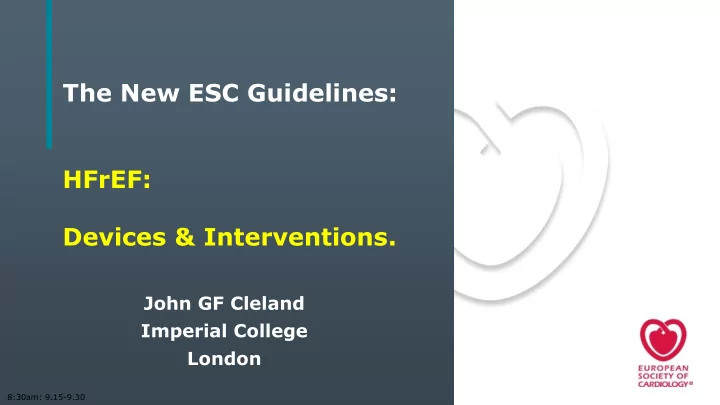

The New ESC Guidelines: HFrEF: Devices & Interventions. John GF Cleland Imperial College London 8:30am: 9.15-9.30
2 www.escardio.org/guidelines
3 www.escardio.org/guidelines
4 ESC Guidelines on Heart Failure • Professional (Expert) Guidelines – No patient involvement (yet) • Evolved from 2012 Guideline – Discouraged from re-interpreting old evidence – Encouraged to respond to new evidence (trials or meta-/re-analyses) • Interpret & Apply Results (Not a Textbook!) – Rather than long summaries • Coordinated with Other ESC Guidelines www.escardio.org/guidelines
5 New (Published) Landmark Trials Since 2012 2013 Inappropriate Activation Echo-CRT BLOCK-HF Mortality www.escardio.org/guidelines BIOPACE not yet published
6 New Published Meta-Analyses Since 2012 Independent predictors of Benefit of CRT • Younger patients • Women • QRS Duration O nly QRS duration predicts CRT prognostic • Not LVEF benefit • Not Aetiology • Not QRS Morphology www.escardio.org/guidelines
7 2012 2016 The ‘Rise’ of Rhythm in Heart Failure www.escardio.org/guidelines
8 Recommendations for implantable cardioverter- defibrillator in patients with heart failure 2012 www.escardio.org/guidelines
9 ‘New’ Issues: >30% of ICD Implants are for Generator Exchange EHRA: units pa ~4,000 (32%) Italy, ~2,000 (27%) UK; ~20,000 (39%) Germany (includes CRT-D) Of patients who required exchange 68% had received no ATP/shock of whom 11% received ATP/shock (FU ~30m) 24% of whom died anyway ATP/Shock Shock www.escardio.org/guidelines
10 2016 2012 www.escardio.org/guidelines
Recommendations for cardiac resynchronization therapy implantation in patients with heart failure www.escardio.org/guidelines
12 QRS Duration / Morphology Debate Longer QRS Duration LBBB QRS Morphology • • Consistently associated with Most of the data is LBBB • • benefit But Threshold 130-140ms • Not used for inclusion • Planned trial inclusion criterion • Mainly retrospective subgroup analyses • Prospective subgroup analyses • Most reports conflate RBBB/IVCD • IVCD have shorter QRS • Is LBBB is just a surrogate RBBB more IHD; often sicker • for QRS duration? LBBB is a surrogate for longer QRS, • DCM and less sick patients www.escardio.org/guidelines
13 Conclusions: CRT QRS 120(130 if NYHA II)-150ms QRS >150ms 2012 • Only LBBB (+/- LBBB) • Only AF if NYHA III (+/- AF) 2016 NYHA II • QRS >130ms NYHA III • LVEF <35% • If SR - NYHA II-IV LVEF LVEF • If AF - NYHA III-IV <35% <30% • Longer QRS Greater Benefit • Does QRS Morphology Matter? www.escardio.org/guidelines
Coronary Revascularization • Two RCTs:- HEART-UK & STICH – both neutral • Revascularization improved neither cardiac function nor HF symptoms • Neither the presence of viability, ischaemia nor angina identify those who had a greater benefit from CABG on mortality. • CABG does improve angina • If revascularization does not improve outcome – why do a coronary angiogram? www.escardio.org/guidelines
Other Interventions • Other Implantable Devices • Other Interventions • Vagal Stimulation • Valves • Baroreceptor Stimulation • Ablation (AV / PV / Renal) • Cardiac Contractility Modulation • Transplantation • Circulatory Support • Ultrafiltration • Algisyl LVR • Other www.escardio.org/guidelines
Recommend
More recommend